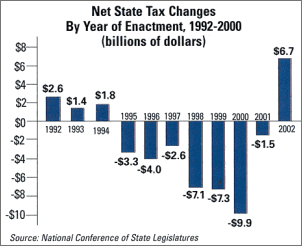S |
tate budgetary shortfalls have mirrored the U.S. economy at large over the past year, prompting many legislatures to adopt stringent measures to curb spending and maintain the tax base. Many held special legislative sessions in order to achieve some fiscal progress.
While some economic development branches have been streamlined, most legislatures and governors have done what they could to limit the bleeding.
“Governor Ryan believes strongly in economic development, and giving us the tools to continue to generate jobs,” says Illinois Department of Commerce and Community Affairs spokesman Brian Reardon. “He knew there would be some pain to spread around, but wanted the least impact possible.”
While state governments across the country raised taxes by some $6.7 billion in FY 2002, Hawaii was the only state in the nation that cut taxes by more than 1 percent. Some 16 states have raised taxes for FY 2003, according to the National Conference of State Legislatures (NCSL). Others have raised fees. Nine states increased corporate and business taxes while eight states cut them.
“For the second year in a row New Jersey registered the largest increase at $824 million,” reads an NCSL report, also singling out a $172-million business tax increase in Pennsylvania and a $58-million raise in Alabama, as well as a delayed cut in the single business tax in Michigan.
Some went ahead with the cutting, led by New York and Indiana (see “Making the Lists,” p. 776), although the elimination of a partial corporate income tax credit for property tax in Indiana meant a tax increase of $96 million. Florida, Louisiana, New Mexico, West Virginia and Washington also reported cuts in business taxes. While six states raised sales taxes, nine cut them, with New York reducing the sales tax on the transmission and distribution services of utilities and Hawaii lowering sales tax on business-to-business transactions. Georgia and West Virginia approved new sales tax holidays.

As for personal income tax, according to the NCSL, nine states, led by Massachusetts, Oklahoma and Oregon, raised them, with Oregon phasing in a voter-approved tax cut over the next two years. Eleven states cut them, again led by New York.
Looking forward, a total of 35 states plan to allow their estate tax to vanish at the same time that the federal version does, in 2005. Hardest hit will be California, which projects a FY 2003 cost of $367 million, ballooning to more than $1.5 billion by FY 2005. Smaller hits will be felt by many states as the result of new federal tax benefits related to retirement and higher education savings scheduled to take effect in coming years.
Perhaps most germane to the corporate real estate arena, 16 states and some city governments have passed laws specifically preventing the special allowance for depreciation, part of the federal Job Creation and Worker Assistance Act, from being claimed. Thirteen others have effectively done the same by not passing conforming legislation. Many legislatures will take up the issue during their 2003 sessions, when 76 percent of those polled by the NCSL expect budget concerns to supplant education as the top legislative issue. — Adam Bruns
Continue to: State-by-state Legislative Review